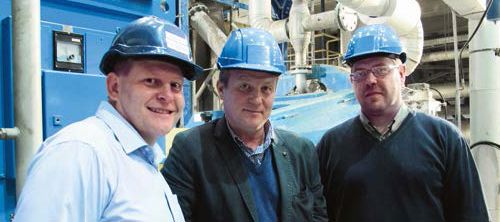Estonian Cell saves with refiner segment agreement, case study
May 23, 2017
In 2012, Estonian Cell, a high-yield mechanical pulp producer - and Estonia's largest consumer of energy - faced a pressing need for additional energy savings in their primary refiner. A profitable solution was found through refiner segment cooperation with Valmet. As a result, Estonian Cell is saving 5 GWh of energy annually.
Soon after Estonian Cell's BCTMP mill in Kunda, Estonia, started producing mechanical pulp in 2006, the local energy market was deregulated, causing electricity prices and its distribution costs to rise to a very high level by 2012.
Lauri Raid, Chief Technology Officer of Estonian Cell, explains: "In mechanical pulping, it is crucial to keep electricity costs under control. Our challenge was to maintain the same high quality level, or even to improve it, and see how much energy we could actually save."
Solution from refiner segment optimization
The previous supplier's refiner had to operate with a very narrow gap that keeps the shives and pulp quality at an optimal level. Accurate measurements of the disc gap were needed in order to maintain this precise gap.
Petteri Vuorio, Technology Manager for Valmet Refiner Segments, worked as one of Valmet's contact people during the project. "When we started, the mill was already very energy efficient, so further optimizing the refining process was challenging."
After positive references and extensive research, the mill signed a ProGap refiner segment optimization agreement in 2012. ProGap combines accurate disc-gap control with Valmet energy-saving segments. The agreement included a new AGS (Adjustable Gap Sensor) to accurately measure the disc gap.
Payback in just a couple of months
The main results in electricity savings come from the optimized refiner segments together with accurate disc gap measurement.

A package deal for an AGS disc gap sensor and a development program for tailor-made, energy-saving refiner segments was a new way of working together. "Improving the primary refiner's energy consumption by 5% makes a huge difference," says Lauri Raid, Chief Technology Officer of Estonian Cell (left) next to Petteri Vuorio, Technology Manager at Valmet (middle) and Ivari Samolberg, Production Manager at Estonian Cell (right).
"At the moment, a 5% energy reduction is keeping our shives at a good level," says Ivari Samolberg, Production Manager at Estonian Cell. "The highest energy savings potential was reached at 12%, but those parameters were not enough for a satisfactory quality level for some grades."
Raid agrees: "We are satisfied with the results. Our primary refiner consumes 45% of all the electricity the mill uses. Improving its energy consumption by 5% makes a huge difference." Annually, this means more than 5 GWh in saved energy. The investment paid for itself in just a couple of months.
Remote control provides rapid support
For easy and fast support, follow-up tools for the AGS sensor were also added to the project. Remote tools allow Valmet to give accurate advice whenever needed.
"For us, remote control helps to quickly describe the situation", says Samolberg. "Valmet sees the measurements online and we don't have to print out the results."
A contract for return segments was also included as an additional service. Valmet recycles the used segments and they are put to good use. This also supports Estonian Cell's environmental goals.
Flexible cooperation
Estonian Cell describes Valmet's service as transparent and customized. "There has been no difference whether it's a working day or the weekend, or even at night - we always get the same rapid service," says Raid. "Petteri understands the problem after just a few words," Samolberg agrees.
Estonian Cell has no plans to remain in its comfort zone. Discussions are ongoing to optimize refiner segment deliveries and minimize warehouse inventory at the mill. "For now, there’s no need to rethink our refiner segment supplier," Raid concludes.
About the mill
Part of Austria's Heinzel Group, Estonian Cell produces high-quality mechanical pulp using low-energy aspen and eco-friendly technology. The end products are fine coated paper and board and tissue grades. With a current capacity of 170,000 tonnes, the mill is aiming for a 200,000 tonne capacity by 2019.
In 2014, the mill was selected by the respected European Business Awards and awarded a Ruban d'Honneur for its environmental and corporate sustainability. They also won the Environmentally Friendly Company in Estonia 2014 award.
For more information on improving your refining process and saving energy, contact your Valmet representative.